
Last Updated: 8 Mar 2022 by jsoares
The Swift Adaptation to Covid-19 by Girl Move Academy in Mozambique (Part 2, Covid-19 Response Series)
by the Girl MOVE Academy Team
Introduction
No matter how much an organization prepares for unlikely events, there will always be unpredictable situations that force us to adapt and grow as quickly as ever before! At Girl MOVE, the global COVID-19 pandemic breakout was one of such situations and it is hard to recall how different life was just five months ago.
Founded in 2013, Girl MOVE is an NGO focused on advancing girls’ education and women empowerment, inspired by the vision of women as disruptive leaders to transform the world. Based in Nampula, Mozambique, Girl MOVE’s main programs aim at equipping Mozambican adolescent girls (called “Mwarusis” in the local dialect of Nampula) ages 12-15 and young women ages 18-30 with the adequate skill set needed to progress their studies and career ambitions and become positive agents of change in their communities.
Our Immediate Response to Covid-19
The first case of COVID-19 in Mozambique was confirmed on the 22nd of March 2020 and seven days later the government declared the state of emergency to contain the spread of virus in the country. Girl MOVE’s pressing concern was to guarantee our girls’ safety and ensure we would be able to stay in touch with them during the lockdown period. With only 2 days to reach nearly 1300 Mwarusis in 10 different neighborhoods before the schools closed, Girl MOVE’s immediate response had to be as swift as possible.
The fastest way was to go directly to the field to spread
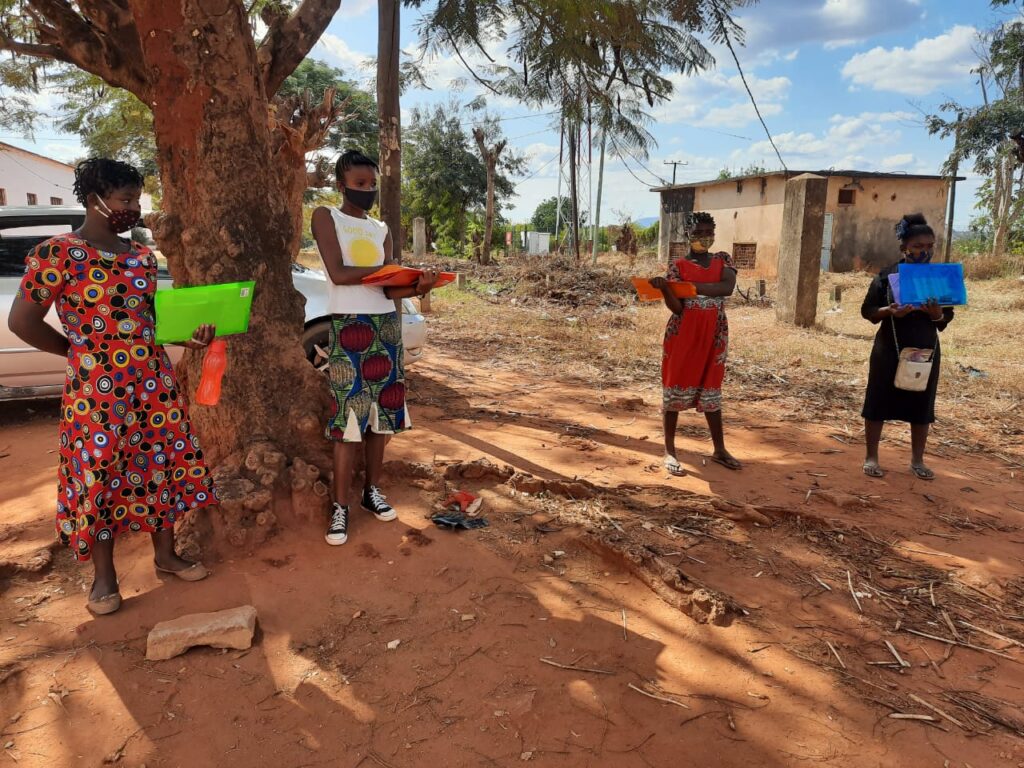
Distribution of educative materials on the field to the Mwarusis (adolescent girls) part of the BELIEVE Program by Girl MOVE. Photo Credit: Girl MOVE Team.
information on COVID-19 infection prevention. Girl MOVE delivered informative group sessions about COVID-19 prevention and distributed a hygiene kit to all the Mwarusis, using vans to ensure everyone’s protection. We quickly understood that visiting the communities on the ground not only made it easier to share important information, but also presented another advantage: it send the girls a message that we would be there for them no matter what, giving them strength and raising their morale.
However, along with the health prevention measures soon came the social and economic concerns. Would the adolescent girls be safe at home during lockdown? Would they have access to support if needed? Would they lose interest in school activities? Would lockdown measures take a toll on the mental health of girls away from their friends and peers?
1st Response: Exploring Digital Platforms to Build Social Capital and Stay in Touch
Action: To stay in touch with our girls and young women from a distance and accompany them in a context of greater fragility, Girl MOVE migrated its programs to the digital space. Digital platforms such as Zoom substituted face-to-face meetings and workshops and running program activities using social networks became the new normal. But soon another challenge emerged: even though most young women had internet access, that was not the case for the ca. 1300 adolescent girls. An effective solution was needed fast to ensure mentors would easily reach out to their mentees. The solution came in the form of phone communication and mentoring sessions quickly began to take place through regular phone calls and text messages.
Concretely, since the lockdown started, the Mwarusis are contacted twice by their mentors: the first contact is done via a text message with a challenge, followed by a phone call a few days later to find out how they are and talk about that challenge. In addition, during the first 3 months of the pandemic, the mentors went to the
field on a weekly basis to continue to connect with the girls, stimulate learning and reinforce safety measures (such as wearing masks and practicing physical distance).
Result: In the beginning of the confinement imposed by the Government, Girl MOVE was only able to reach by telephone 69% of the total of 1271 adolescent girls supported. However, since then, this number has been increasing and we are now able to maintain contact with more than 80% of the adolescent girls each week. Of
these, only 6% own a mobile phone, forcing them to rely on someone else’s cellphone in their households to be contacted (usually a family member or a neighbor). Unexpectedly, this “opened” the door for Girl MOVE to enter their homes, since parents, siblings or caretakers had to make themselves and their cellphones available, enabling them to be part of this solution and allowing the relationship to keep flourishing.
2nd Response: Literacy and Change-making Attitude Using Gamification
As the weeks went by, at Girl MOVE we did not decrease our efforts and took every challenge coming our way as an opportunity to innovate. The innovative ideas were brought up by the young women (the mentors) themselves. They were the first ones to come forward to discuss ideas and create effective solutions on how to respond to the challenges ahead.
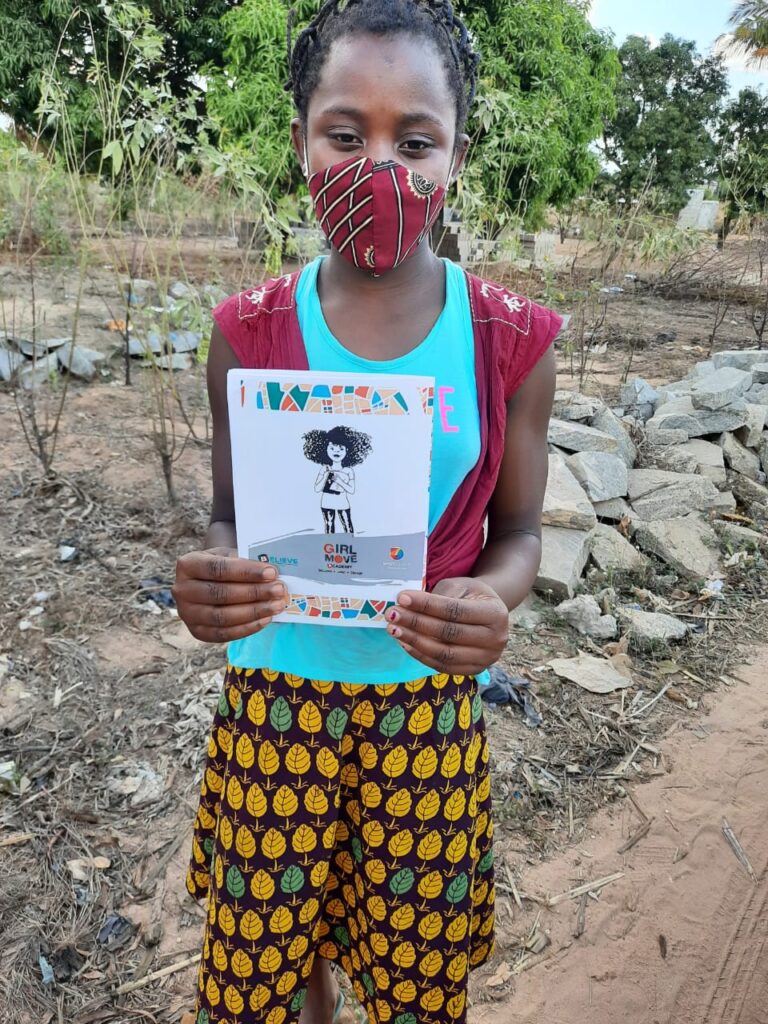
A Mwarusi (adolescent girl) part of the BELIEVE Program by Girl MOVE receiving her “Literacy Game” kit. Photo Credit: Girl MOVE Team.
Girls forced to stay at home meant that all their time would now be dedicated to caregiving activities, from doing all the domestic work to taking care of their siblings, sick family members and elderly people. The longer the time girls are at home the higher the risk of dropping out of school completely. To avoid this, and guarantee they would somehow stay connected with school, with the help of the mentors Girl MOVE launched the “Literacy Game”, a gamified learning tool to promote girls’ interest in education as they are in their final year of secondary school, delivering to the girls a game kit (in paper) with playful challenges, activated through phone calls and text messages.
Besides interrupting their education, girls at home are also more likely to suffer from domestic and gender-based violence, and lockdown measures make it almost impossible to ask for help. In an effort to counteract the effects of the pandemic crisis, Girl MOVE created a remote communication system that made it possible to stay connected to the adolescent girls. But what at first appeared to be just a communication strategy to keep in touch with girls
at a distance, proved to be much more than that: it is also a strategy for detecting and acting on risk cases, since girls now have access to a social supporting network that they can activate by reaching out to their mentors when and if needed.
This response was also supported through safe approaches to the community, using vans that went visiting the communities to distribute educative challenges, necessary materials and raise motivation.
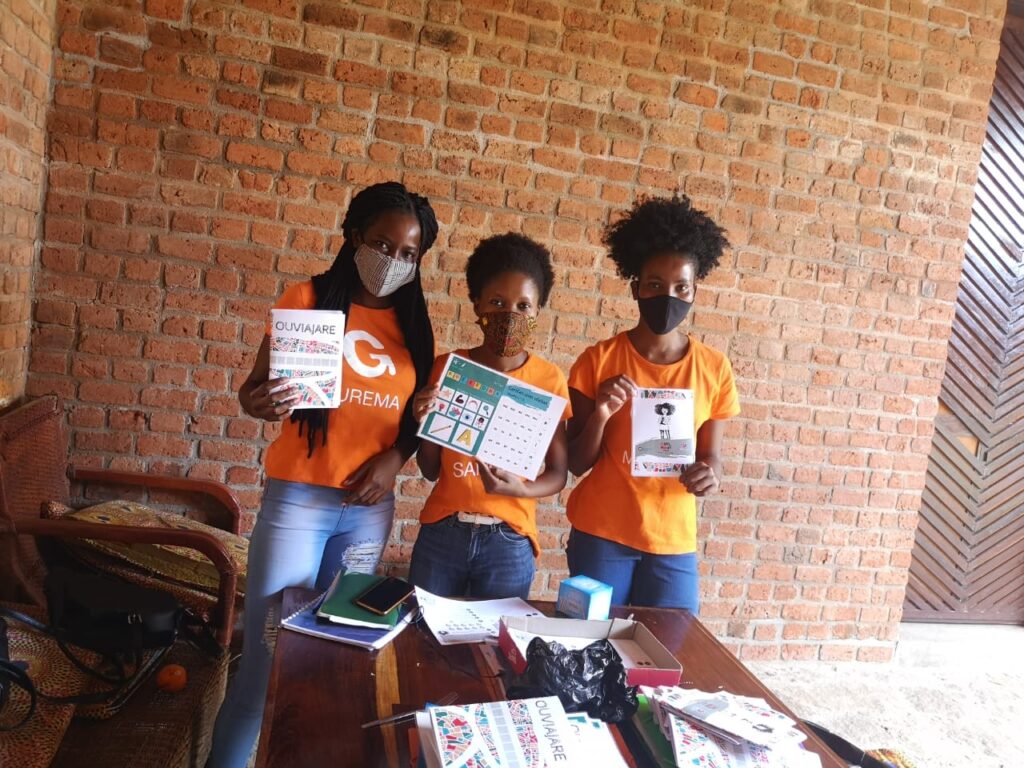
3 “Girl Movers” (young women part of the CHANGE Program of Girl MOVE) at the Girl MOVE Academy ECO Campus showcasing the educative materials and the “Literacy Game” kits to be distributed to the Mwarusis on the field. Photo Credit: Girl MOVE Team.
3rd Response: Income Generation Activities and Technology Appropriation by Women
Additionally, as families struggle financially, young girls become a burden on their families, increasing the need to find income-generating activities as well as the pressure to marry at a very young age, which often leads to early pregnancy. Women also represent most of the informal economy workforce, meaning they are usually hit first by economic hardship. To help women find income-generating activities, Girl MOVE piloted professional labs in partnership with private companies to promote the appropriation of relevant technology by women. For example, in off-grid areas where difficulties felt are greater, we provided women with sewing machines with solar panels to produce and sell reusable face masks and delivered solar panel ovens to be tested in communities. A critical action point was to challenge our young women to implement these income-generating projects, allowing them to incorporate a can-do attitude and develop change-making skills.
Lessons Learned and an Unpredictable Future
Perhaps the biggest take-away from this pandemic crisis is that a quick response is only possible when female social capital is already established. As we have testified, when girls and women are empowered, once a crisis strikes, they are ready take the lead and activate community resources and have the capacity to face the associated health, economic and social impacts.
Looking ahead, until an effective vaccine is massively produced and globally distributed, there is no way we can predict how the future will look like. But one thing we know for certain: this pandemic threatens to delay or even eliminate the gains made in gender equality so far, intensifying the vulnerability of young girls and women in a context of health and social crisis.
Never has Girl MOVE’s work been so relevant! We know a transformative power lies inside every girl and woman and will continue to work tirelessly to make sure it is not a global pandemic that will take away their education and their ability to change the world for the better.
For more information about Girl MOVE, please visit: https://www.girlmove.org/.
Category: Africa, Covid, field experience, Lusophone Africa, on-the-ground
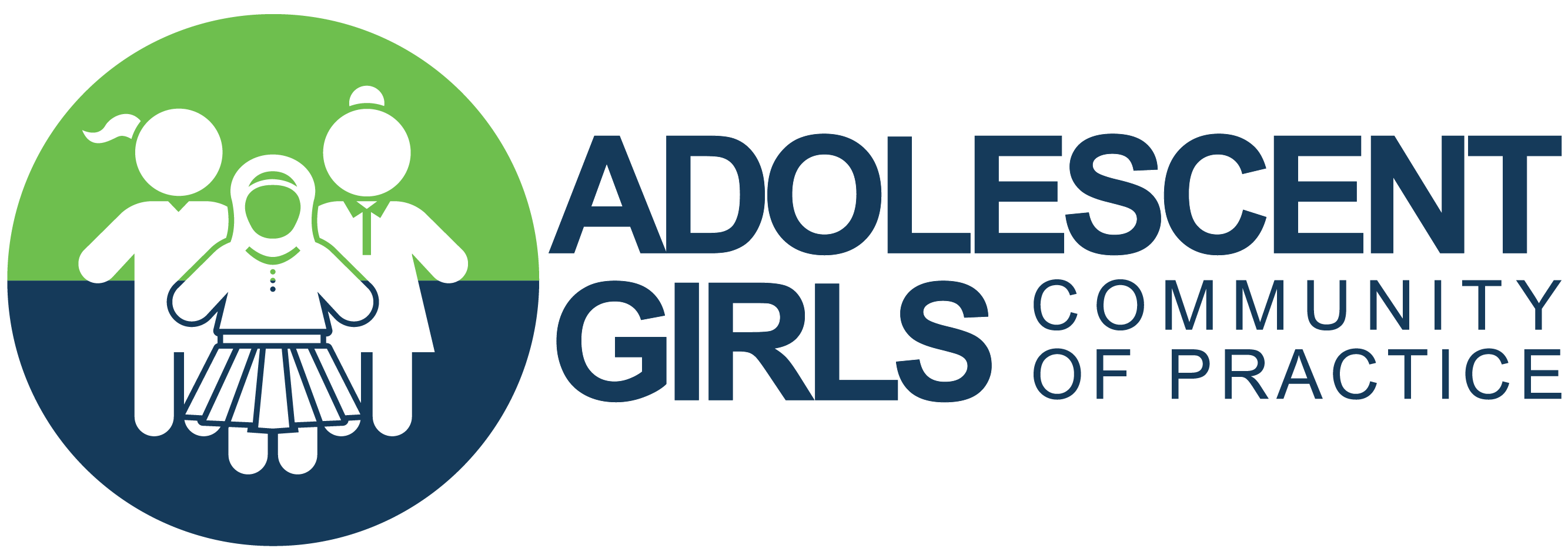
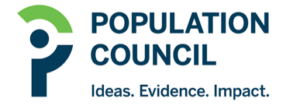

Wow, I’m one of the Girl Movers there and it’s a pleasure to work on this project, doing something to Change the World❤️❤️ Girl Move Academy ????